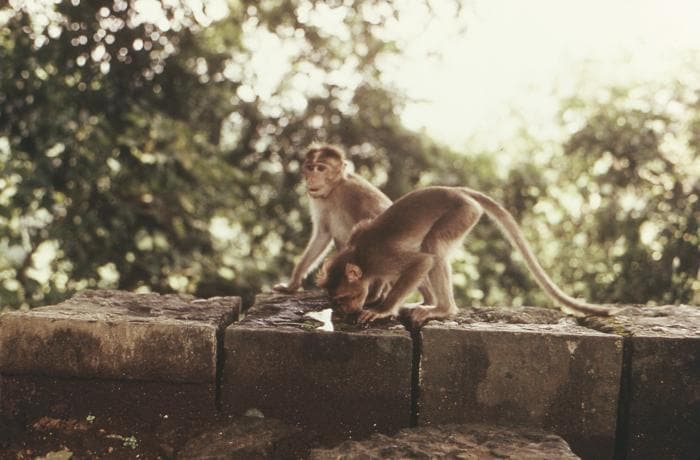Key points
- Although rare, B virus infections in people are usually caused by macaque monkeys.
- There are no vaccines that can protect you against B virus infection.
- To prevent infections, stay away from macaque monkeys.

What causes it
Macaques are a common source of B virus
B virus can be found in a macaque's:
- Saliva
- Feces (poop)
- Urine (pee)
- Brain or spinal cord tissue
- Cells if they are an infected monkey in a lab
Other primates, such as chimpanzees and capuchin monkeys, can become infected with B virus and will frequently die from these infections. There have not been documented cases of such primates spreading B virus except to macaques.
B virus infections in people are rare
Since B virus was identified in 1932, only 50 people have been documented to have infections. Of these people, 21 died. Most of these people got infected after they were bitten or scratched by a monkey; or when tissue or fluids from a monkey got on their broken skin, such as by needle stick or cut. In 1997, a researcher died from B virus infection after bodily fluid from an infected monkey splashed into her eye.
Hundreds of bites and scratches occur every year in monkey facilities in the United States, but people rarely get infected with B virus. A study of more than 300 animal care workers showed that none had B virus infection, including the 166 workers who had possible exposures to monkeys.
How it spreads
B virus can spread from infected macaque monkeys to people.
You can get B virus if you:
- Are bitten or scratched by an infected monkey.
- Get an infected monkey's tissue or fluid on your broken skin or in your eyes, nose, or mouth.
- Have a needle stick by a contaminated syringe.
- Scratch or cut yourself on a contaminated cage or other sharp-edged surface.
- Are exposed to the brain (especially), spinal cord, or skull of an infected monkey.
- Touch a wet surface B virus that has the virus. B virus can survive for hours on surfaces, particularly when moist.
How common is B virus from humans?
How to prevent spread
There are no vaccines that can protect you against B virus infection. To avoid getting B virus:
- Stay away from macaque monkeys
- Do not touch or feed them
- Follow appropriate laboratory and animal facility protocols
Risk factors
Most people will not come in contact with monkeys, so their risk of getting infected with B virus is very low.
Working with macaque monkeys like in laboratories, animal hospitals or clinics can increase your risk or getting B virus infection.
In recent years, many macaque attacks have been reported by people visiting temple parks in some countries in Asia, where macaques commonly roam freely. About 70 to 80% of these macaques have been found to be B virus positive, but there have not been any documented cases of B virus spreading to humans.
